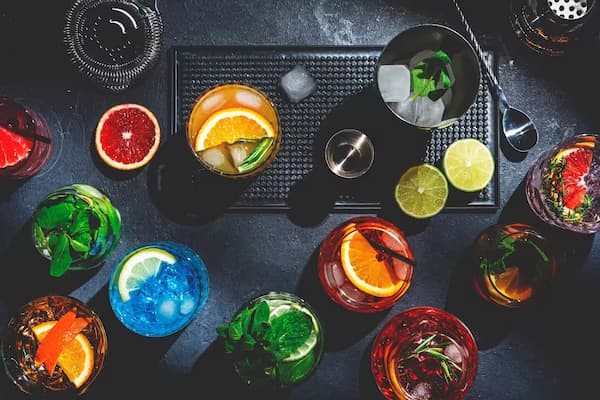Dry gin
With Dry gin you can make
Citrusy twist on a classic.
Dry Martini Franklin
Dry gin, White vermouth, Orange Bitters
Elegant and Bittersweet
Fitzgerald
Dry gin, Lemon Juice, Sugar / simple Syrup, Angostura Bitters
A floral and tropical escape in every sip
Velo
Dry gin, Elderflower Liqueur (St-Germain elderflower liqueur), Lime juice, Passion fruit Syrup (Liber & Co. passion fruit syrup), Peychaud's Aromatic Bitters
A friend to your taste buds
Old Friend
Aperol, Dry gin, Elderflower Liqueur, Pink Grapefruit Juice
A timeless sip of sophistication.
Martini Perfect
Dry gin, White vermouth, Red vermouth, Angostura Bitters
Sophistication meets subtle wet finesse.
Dry Martini Wet
Dry gin, White vermouth, Orange Bitters
A taste of luxury in every sip.
Million Dollar Cocktail
Dry gin (Hayman's (if available)), Red vermouth (chilled), Pineapple Juice, Grenadine, Egg
A sweet and spicy twist awaits
Oliver Twist
Dry gin, Elderflower Liqueur, Lager, Lemon Juice, Honey (A jar of honey to create chilli infused honey. Only 1 tbsp is needed in the cocktail.), Chilli peppers (Added to the honey to create the chilli infused honey.)
Fresh Minty Zing
Southside
Dry gin, Lime juice, Sugar / simple Syrup, Mint Leaves
We've got 9 cocktails that can be made with Dry gin.
Find out what to make with Dry gin
Q&A
What is the history of Dry Gin?
Dry gin, particularly the London Dry Gin that many are familiar with, has its origins tracing back to early 17th-century Holland. It was first distilled by the Dutch physician Franciscus Sylvius who is credited with its invention. Initially, gin was used for medicinal purposes, such as treating stomach complaints, gout, and gallstones. Its popularity soared in Britain during the late 17th and early 18th centuries, partly due to the government's measures that made it cheaper and easier to produce gin than to import spirits from abroad. Over time, the production process evolved, and the focus on quality increased, leading to the refined dry gin enjoyed worldwide today.
What sets London Dry Gin apart from other types of gin?
London Dry Gin is distinguished by its production process and the strict regulations governing it. Unlike other gins, London Dry Gin must be distilled to a completely neutral spirit of 96% alcohol by volume (ABV), after which it can only be flavored with natural botanicals. No artificial flavors or colors can be added, and any sweetness comes strictly from the botanicals used in distillation. This results in a gin that is light, clean, and complex in flavor, with a prominent juniper berry taste, without any added sugar or color. Despite its name, London Dry Gin does not have to be produced in London; rather, it refers to the style and quality standards.
What are some classic cocktails that feature Dry Gin?
Dry gin is a staple ingredient in many timeless cocktails, showcasing its versatility and ability to blend with various flavors. Classic examples include the Martini, a sophisticated mix of gin and dry vermouth, garnished with an olive or a lemon twist; the Gin and Tonic, a refreshing combination of gin, tonic water, and a slice of lime or lemon; and the Negroni, an aromatic blend of gin, Campari, and sweet vermouth. Each of these cocktails highlights dry gin's crisp, herbal profile, making it a favorite base spirit among mixologists.
How should Dry Gin be stored to maintain its flavor?
To preserve the delicate flavors and aromas of dry gin, it should be stored in a cool, dark place away from direct sunlight and extreme temperature fluctuations. Once opened, the bottle should be tightly sealed to prevent oxidation, which can alter the spirit's taste and quality. Unlike wine, gin does not age or improve in the bottle, so it's best consumed within a few months to a year of opening for optimal taste, although it will remain safe to drink beyond this time.
Can any other spirit replace Dry Gin in cocktails?
While dry gin has a unique flavor profile, some spirits can be used as substitutes in cocktails, depending on the desired outcome. Vodka is a common substitution due to its neutral flavor, making it a versatile option for those looking to tone down the botanical presence in a drink. For a more aromatic alternative, one could use aquavit or even genever, which both offer distinct herbal qualities that can mimic the complexity of gin to some extent. However, it's important to note that replacing gin will inevitably change the character of the drink.
Dry gin Brands
Ingredients like Dry gin
Other Gins
How it works
Easily create your bar from the ingredients you have at home, and we'll show you what you can make with the ingredients you have to hand.
Once you've added this ingredient head to your My bar page and fill up everything else you have.
We'll also show you cocktails that can make by substituting what you have for one of the ingredients you don't, riffing on the original. Now go forth and create something delicious!







